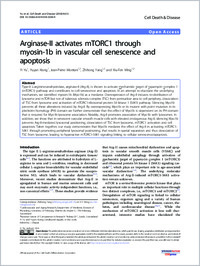Arginase-II activates mTORC1 through myosin-1b in vascular cell senescence and apoptosis
- Yu, Yi Cardiovascular and Aging Research, Department of Medicine, Division of Physiology, University of Fribourg, Switzerland
- Xiong, Yuyan Cardiovascular and Aging Research, Department of Medicine, Division of Physiology, University of Fribourg, Switzerland
- Montani, Jean-Pierre Cardiovascular and Aging Research, Department of Medicine, Division of Physiology, University of Fribourg, Switzerland - National Center of Competence in Research "Kidney.CH, Switzerland" Zurich, Switzerland
- Yang, Zhihong Cardiovascular and Aging Research, Department of Medicine, Division of Physiology, University of Fribourg, Switzerland - National Center of Competence in Research "Kidney.CH, Switzerland" Zurich, Switzerland
- Ming, Xiu-Fen Cardiovascular and Aging Research, Department of Medicine, Division of Physiology, University of Fribourg, Switzerland - National Center of Competence in Research "Kidney.CH, Switzerland" Zurich, Switzerland
-
22.02.2018
Published in:
- Cell Death & Disease. - 2018, vol. 9, no. 3, p. 313
English
Type-II L-arginine:ureahydrolase, arginase-II (Arg-II), is shown to activate mechanistic target of rapamycin complex 1 (mTORC1) pathway and contributes to cell senescence and apoptosis. In an attempt to elucidate the underlying mechanism, we identified myosin-1b (Myo1b) as a mediator. Overexpression of Arg-II induces re-distribution of lysosome and mTOR but not of tuberous sclerosis complex (TSC) from perinuclear area to cell periphery, dissociation of TSC from lysosome and activation of mTORC1- ribosomal protein S6 kinase 1 (S6K1) pathway. Silencing Myo1b prevents all these alterations induced by Arg-II. By overexpressing Myo1b or its mutant with point mutation in its pleckstrin homology (PH) domain we further demonstrate that this effect of Myo1b is dependent on its PH domain that is required for Myo1b-lysosome association. Notably, Arg-II promotes association of Myo1b with lysosomes. In addition, we show that in senescent vascular smooth muscle cells with elevated endogenous Arg-II, silencing Myo1b prevents Arg-II-mediated lysosomal positioning, dissociation of TSC from lysosome, mTORC1 activation and cell apoptosis. Taken together, our study demonstrates that Myo1b mediates the effect of Arg-II in activating mTORC1-S6K1 through promoting peripheral lysosomal positioning, that results in spatial separation and thus dissociation of TSC from lysosome, leading to hyperactive mTORC1-S6K1 signaling linking to cellular senescence/apoptosis.
- Faculty
- Faculté des sciences et de médecine
- Department
- Département de Médecine
- Language
-
- English
- Classification
- Biological sciences
- License
-
License undefined
- Identifiers
-
- RERO DOC 309048
- DOI 10.1038/s41419-018-0356-9
- Persistent URL
- https://folia.unifr.ch/unifr/documents/306532
Statistics
Document views: 154
File downloads:
- pdf: 193
